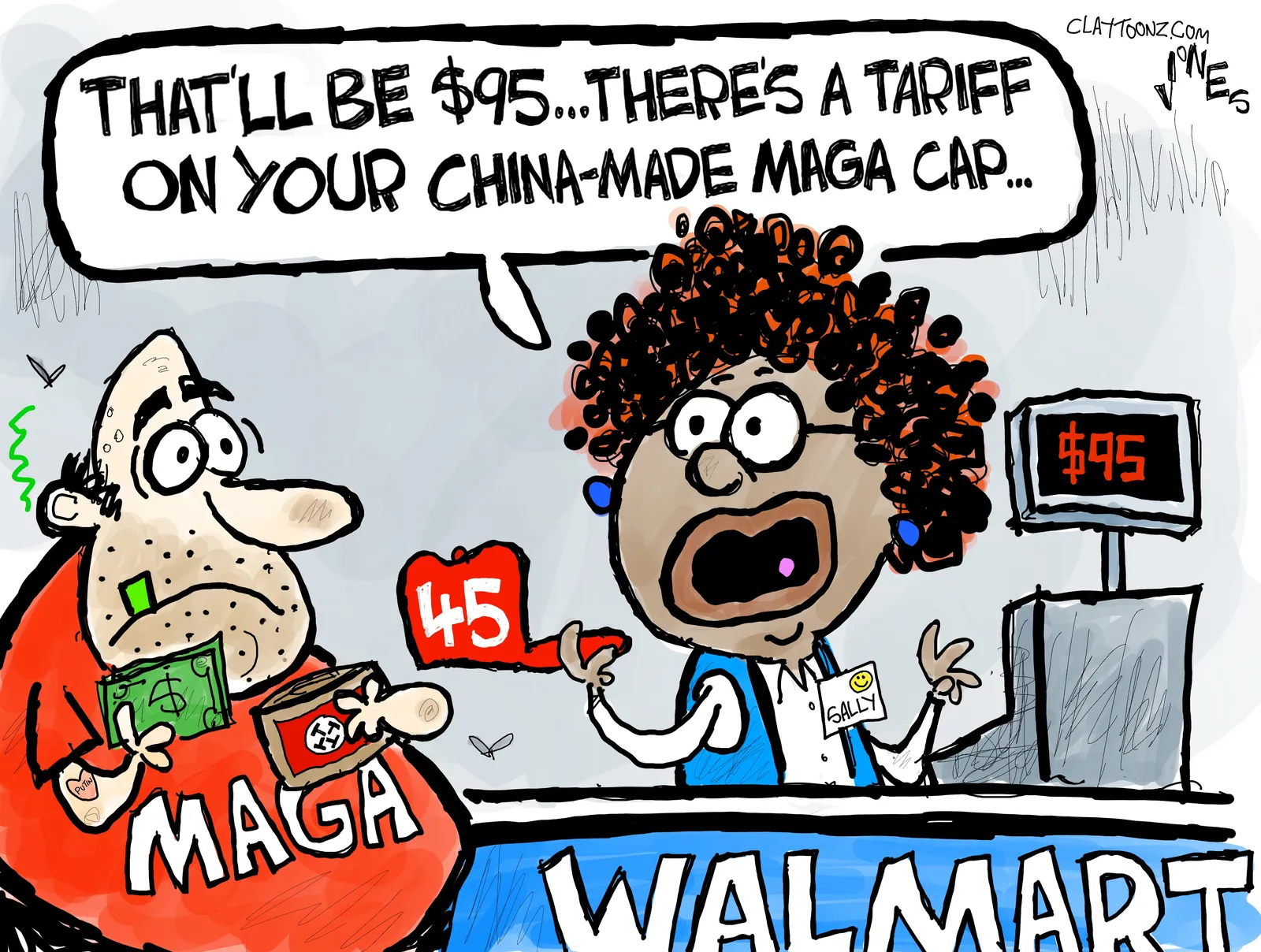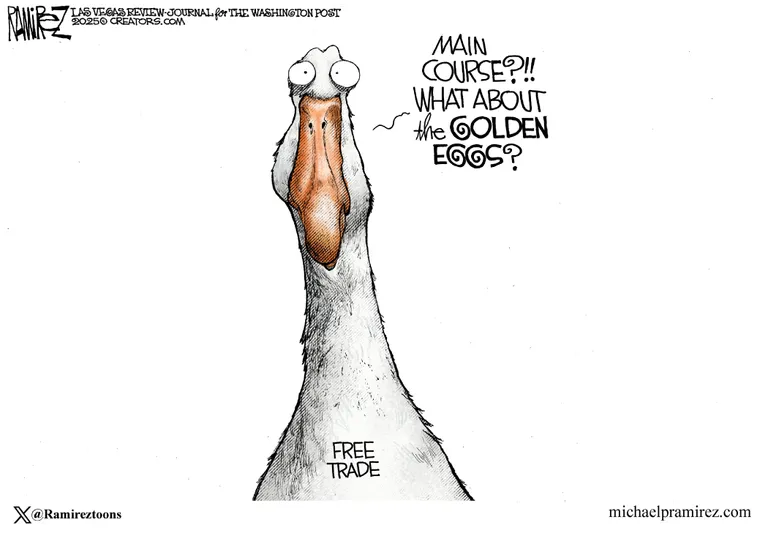'Old Donald' steps back on his China trade warAlmost all US presidents over the last 20 years have been frustrated at China’s refusal to open its markets to US products, among other issues, including Chinese intellectual property theft. Intimidating Beijing might have worked 25 years ago. But China is now a superpower. It can hurt the US as much as the US can hurt China.
“I think the Chinese are going to feel vindicated,” Richard Haass, president emeritus of the Council on Foreign Relations told CNN’s Kasie Hunt. “We imposed tariffs on China; China pushed back with large tariffs of their own. It looks to be the United States that is backing down. From China’s point of view, this is how they hoped it would play out.”
Beijing’s refusal to blink was predictable, although the White House, which seems to lack expertise on China, appeared surprised.
“If a negotiated solution is truly what the US wants, it should stop threatening and blackmailing China and seek dialogue based on equality, respect and mutual benefit,” Chinese Foreign Ministry spokesperson Guo Jiakun said Wednesday. “To keep asking for a deal while exerting extreme pressure is not the right way to deal with China and simply will not work.”
Ukraine pushes back at US pressure “The situation for Ukraine is dire — He can have Peace or, he can fight for another three years before losing the whole Country,” 'Old Donald' wrote on Truth Social. “We are very close to a Deal, but the man with ‘no cards to play’ should now, finally, GET IT DONE.”
'Old Donald' is angry about Zelensky’s opposition to America’s proposed recognition of Russian sovereignty over Crimea – a region annexed illegally by Putin in 2014.
“I think Russia is ready. I think we have a deal with Russia,” 'Old Donald' said Wednesday in the Oval Office, once again empathizing with the aggressor rather than the victim of the conflict.
At the start of “The Art of the Deal,” 'Old Donald' wrote that while other people paint beautifully or write wonderful poetry, “deals are my art form.”
The White House is edging back from the brink in its trade war with China. The question for investors is how the world’s two biggest economies can get to the off-ramp and what a de-escalation looks like.
He said he has "no intention of firing" Jerome Powell after repeatedly criticising the head of the central bank, but he added that he would like Powell to be "a little more active" on cutting interest rates.In his comments to reporters on Tuesday, 'Old Donald' said he would be "very nice" in negotiations with Beijing - in the hope of securing a trade deal.
It is unclear whether 'Old Donald' has the authority to fire the Fed chair. No other US president has tried to do so.
“I was watching the bond market,” he said. “The bond market is very tricky.”His administration’s deregulatory agenda has already benefited some of his businesses — including a lucrative cryptocurrency venture — and one of his core campaign promises of lowering interest rates would most likely enrich his investment portfolio.

- The White House’s 8 Big Tariff Flip-Flops Since ‘Liberation Day’
As markets experienced whiplash after President 'Old Donald' imposed sweeping tariffs on foreign imports—only to then back off some of them— the White House’s comments on “Liberation Day” have flip-flopped over time, raising questions about how much is actually going to plan or a response to plunging markets.
- To slow China’s tech advances, 'Old Donald' should keep its factories addicted to cheap exports via low tariffs, economist says
'Old Donald''s on-again, off-again tariffs have taken the global economy on a wild ride, but China has been his main target and faces prohibitively high duties.Beijing has drawn its conclusion: innovation and core technology control is the only sustainable defense against tariffs," she explained. "Companies with proprietary technology—like Huawei and BYD—are more insulated from tariffs and supply-chain shocks. China envisions a new tech supply-chain model: regional production, tech sovereignty and global supply-chain redundancy."
Privately, 'Old Donald' is thought to have been convinced by his advisers that ousting the Fed chair would cause more volatility in financial markets.
His administration�~@~Ys deregulatory agenda has already benefited some of his businesses �~@~T including a lucrative cryptocurrency venture �~@~T and one of his core campaign promises of lowering interest rates
Commentators in Chinese state media have for years argued, opens new tab their government should use the debt to pressure Washington, whereas this week U.S. Treasury Secretary Scott Bessent said those holdings - estimated at $1.1 trillion by Brad Setser of the Council on Foreign Relations - provide no leverage whatsoever.Pro-"Old Donald" creators play down market turmoil: ‘Losing money costs you nothing’Yet, Bessent's broader point stands: weaponising Treasuries would be at best both dangerous and difficult for China. The gloves might one day come off if the People’s Republic lets its currency float freely, but President Xi Jinping has expressed a strong desire to keep the yuan stable. For now, China’s holdings of American debt will hamper more rapid financial decoupling - even if Beijing and Washington might prefer otherwise.
After President "Old Donald"’s tariff pledge last week sent stock prices plunging, pro-"Old Donald" influencer Benny Johnson offered his 3 million followers a rosy perspective on the news. “Losing money costs you nothing,” he said on his podcast. “In fact, it builds quite a bit of character.”
MAGA content creators were close observers of the stock market during Biden’s term, casting every slide as an American crisis for which the president bore full blame. But after "Old Donald"’s tariffs sparked a market meltdown and whiplash return amid fears of an escalating trade war, some have scrambled to offer alternative explanations for the financial tumult, or to explain why such bloodletting is worth the cost.
"Old Donald" was upset that other countries were taking advantage of the United States. The debt was growing. The stock market had crashed. He freely shared his opinions.“I believe very strongly in tariffs,” he said. “All of the many nations that abuse the United States should pay a major tax — like a 15 or 20 percent tax on any product they sell in the United States.”

It was the late 1980s. Not much has changed.
"Old Donald" most prominently began articulating his current beliefs in 1987, as he began weighing a run for the presidency. He spent $100,000 on an ad he termed an “open letter” that was published in The Washington Post, the New York Times, and the Boston Globe.
"Old Donald" has always described tariffs as a tax on imports that other countries would pay to the United States. History shows that’s not typically how it works. Importers pay the taxes, but often they, manufacturers and retailers pass those costs on to American consumers.

Then as now he didn’t blame the foreign countries for taking advantage of favorable policies. He blamed the United States leaders for allowing it to happen.
“That expression ‘a kinder, gentler’ America is the worst,” he said, a slam at then-President George H.W. Bush, who used the phrase to try to usher in an era of national civility in the face of a changing global landscape. “If we get any kinder or gentler, we’re not going to have any America.”
"I dont' know why 'Old Donald' didn't learn the lesson of the Smoot-Hawley tariff."
However, why 'Old Donald' may not have learned the lesson of the Smoot-Hawley lesson, the Federal Reserve has. That's why he suspects lower interest rates are coming.
But it doesn't appear to have changed the central bank's cautious, wait-and-see stance.
'Old Donald': CUT INTEREST RATES, JEROME AND STOP PLAYING POLITICS!"
“The markets are going to boom, the stock is going to boom, the country is going to boom,” he said when asked about the market as he left the White House to fly to one of his Florida golf clubs.The announcement jolted markets worldwide, but 'Old Donald' said that was to be expected. He compared the United States to a sick patient in need of surgery when asked by a reporter for his reaction to the worst stock market drop in years.
- US stocks lead worldwide sell-off after 'Old Donald'’s tariffs cause a COVID-like shock

Taiwanese President Lai Ching-te said he was looking forward to “working closely with the U.S. to ensure a fair, mutually beneficial approach that strengthens our shared prosperity.”A delegation of Vietnamese officials led by Deputy Prime Minister Ho Duc Phoc is set to visit Washington this weekend in the hope of negotiating better terms, according to Vietnamese state media.
Despite repeatedly ruling out negotiations, "Old Donald" told reporters after U.S. markets closed down sharply Thursday that he would be open to striking deals with individual countries.
“Every country is calling us. That’s the beauty of what we do,” "Old Donald" told reporters on Air Force One Thursday night. “We put ourselves in the driver’s seat. If we would have asked these countries to do us a favor, they would have said no. Now they will do anything for us.”
Tan reported from Singapore. Lyric Li in Seoul contributed to this report. What readers are saying The comments express strong criticism of "Old Donald"'s tariff policies, describing them as extortionate, impulsive, and potentially destabilizing to global markets. Many commenters believe these tariffs are driven by "Old Donald"'s ego and self-interest rather than sound economic... Show more This summary is AI-generated. AI can make mistakes and this summary is not a replacement for reading the comments.
Mr. 'Old Donald' had not previously given much air to concerns about the region, unlike his lengthy tirades against countries like China and Mexico, said Priyanka Kishore, an economist in Singapore and the founder of Asia Decoded, a consulting firm. “And then bam, Southeast Asia gets hit really hard,” she said.The United States is Vietnam’s largest export market, accounting for more than 30 percent of its total exports, including consumer electronics, smartphones, garments and footwear and wood furniture. Around a third of U.S. footwear was made in the country last year, making it the largest exporter of shoes to the United States. Nike, the sportswear brand, produces about 50 percent of its footwear in Vietnam.
For American business owners such as Patrick Soong, who helps U.S. companies to design and make their products in the region, the tariffs on Thursday create uncertainty. His clients make everything from luggage to camera accessories to medical devices.
Still, Marcelo Ebrard, Mexico’s economic minister, said Mexico’s actions helped address complaints and concerns aired by 'Old Donald', aiding Mexico’s standing in talks with Washington. Mexico deployed troops to the U.S.-Mexico border to control immigration and beefed up efforts to counter the production and smuggling of fentanyl, the synthetic opioid, while turning over dozens of wanted drug traffickers to the United States.
The policy is absurd. It’s also an extension of 'Old Donald'’s chaotic personality.The most fitting analysis for this moment, however, does not come from an economist or a financial researcher. It comes from the screenwriter William Goldman, who pithily captured his industry’s lack of foresight with one of the most famous aphorisms in Hollywood history: “Nobody knows anything.”